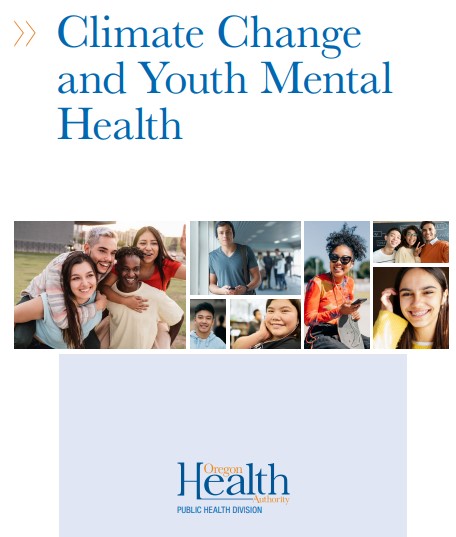PORTLAND, Ore. — Increasing extreme weather events and climate-related disasters, climate stressors such as water and food insecurity, slow progress from leaders and increased awareness of the negative impacts of climate change are leading to feelings of hopelessness, despair, anxiety and frustration among young people, an Oregon Health Authority (OHA) report has found.
The report, Climate Change and Youth Mental Health in Oregon, also found that youth feel dismissed by adults and older generations in society, and are angry that not enough is being done to protect their future. They recognize that vulnerability to climate change is closely linked with systemic racism and structural oppression, and that both need to be simultaneously addressed.
OHA’s Environmental Health Assessment Unit prepared the report in response to Oregon Gov. Kate Brown’s Executive Order 20-04, which directs state agencies to take actions to reduce and regulate greenhouse gas emissions. The report shares research on how climate change affects mental health. It includes results from a literature review, youth focus groups, key informant interviews, and learnings from youth story circles.
The report is packed with quotes from young people about the effects of climate change on their mental health, such as:
- “It is a huge weight…just really overwhelming and I already have generalized anxiety. So now I have to also deal with the climate crisis. It’s just really scary and frustrating. I just wish I could be ignorant and not care.”
- “(Adults have) already lived their futures, if that makes sense. But I still don’t know what mine’s gonna look like because of this existential threat. And so it’s like yelling at the wall about like, this really scary thing, but not really hearing anything back.”
- “It’s like a constant thing. And it’s like it affects all things and includes the wildfires on top of the settlers on top of their violence. And then thinking more broadly and globally, because I’m also indigenous to the islands of Tonga, a lot of our people are climate refugees and are no longer able to return home to the islands because it’s sinking and cemeteries are underwater. And that’s also settler induced climate change… I feel like climate change cannot be talked about without talking about settler colonialism, white supremacy and, like, genocide…”
For others, like Eliza Garcia, a 21-year-old University of Oregon student, the pressure of wanting to do more but knowing it may not be enough can be overwhelming.
“I feel this constant pressure to save the world from climate change,” Garcia said. “It’s the fear for our future and the guilt that I’m not doing enough if I’m not constantly working to fight climate change. It’s not fair, and I wish more was being done so that I don’t have to feel like this all the time and so people much younger than me don’t have to grow up with these feelings as well.”
Saraya Lumberas, 16, a Crater High School student in Medford, agrees. “I want people in power to know that this is our future. Our world. We don’t want to live with the consequences of their actions because they ignore the climate crisis and they ignore youth,” she said.
Ukiah Halloran-Steiner, 17, who lives in Yamhill County, said OHA’s report “proves something that young people have long known. The psychological weight of climate change is constantly upon us and the hopelessness of the crisis is inescapable if the adults in power continue with ignorance and inaction.”
Julie Early Sifuentes, M.S., with OHA’s Climate and Health Program and the report’s lead author, said the report demonstrates the link between worsening climate events and growing climate-related distress.
“As climate effects get worse, youth are becoming very worried about their future and the future of their younger siblings,” Sifuentes said. “I hope this report gets more conversations going in communities across the state, about how we can join with youth in confronting these crises.”
Meg Cary, M.D., M.P.H., child and adolescent psychiatrist and senior health advisor at OHA, who served as an adviser to the study, said the report and the conversations and actions that follow represent the “first step to promoting youth emotional health during this time of uncertainty, fear and dismay.”
“Youth have spoken to what they need to move forward, including stronger connections with community, culture and nature, better access to mental health services and participation in policy making,” she said. “Protecting youth mental health is a state and national urgency. Collective and coordinated investments in these priorities is the next step in fostering youth well-being.”
The report concludes with a call to “decision-makers, educators, mental health professionals and environmental professionals” who have “opportunities to support youth mental health and resilience in the face of climate change …” These opportunities include:
- Sharing power with youth in decision-making about climate and mental health policy and solutions to increase youth’s sense of hope, belonging and agency.
- Educating themselves about the connection between climate change and youth mental health including healing centered approaches to engage with youth.
- Increasing investments in school and community mental health services. These investments are needed to meet increasing demands to support youth, family, and community well-being.
“Youth need to feel a sense of control and empowerment when it comes to climate change,” Sifuentes explained. “Addressing these needs will build their confidence and resilience as they help society develop meaningful solutions to take on these environmental effects into the future.”
Cary added that an important takeaway for parents, other family members, educators, and mental health therapists is that they need to listen to, and not dismiss, youth who are experiencing climate anxiety.
“Listening means creating a space where the young people in your lives can express their full range of emotions, and it also means to join youth in engaging in actions and solutions,” Cary said. “For youth, I hope that they when they read this report, they feel heard and that they are not alone.”
For more information, including a link to the report and additional background, visit the Climate Change and Mental Health Effects page.


